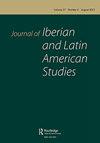人性、客观社会结构与社会改革:1870-1930年西班牙工会工人对社会立法的态度
IF 0.3
0 HUMANITIES, MULTIDISCIPLINARY
Journal of Iberian and Latin American Studies
Pub Date : 2023-01-02
DOI:10.1080/14701847.2023.2184011
引用次数: 0
摘要
本文解决了为什么劳工立法在显然从中受益的人口部门之间产生不同的,通常是对立的反应的问题。特别是,它探讨了1870年至1930年间西班牙工会工人对社会改革态度的变化。这些工人先前拒绝国家干预劳资关系。自1870年以来,大多数人继续没有呼吁社会法律,但偶尔要求应用那些已经批准的法律。他们中的第二股势力,由无政府工团主义协会组织起来,重申他们反对这些改革。第三种趋势是由社会主义组织组成的,他们最初反对劳工立法,但最终支持它。本文的分析旨在通过考察工会在媒体、宣言和公开声明以及劳工冲突中的表达,来解释这些工会的态度。它表明,这些态度是基于对当时塑造工人观念和行动的社会关系的两个假设之一:“社会人性”和“客观社会结构”。它的主要论点是,这两种关于社会是什么的假设,是从对先前概念的部分重新构想或拒绝中出现的,这些概念一直推动着工会的行动,直到19世纪后期。本文章由计算机程序翻译,如有差异,请以英文原文为准。
Human nature, objective social structure, and social reforms: unionized Spanish workers attitudes towards social legislation, 1870–1930
ABSTRACT This paper addresses the question of why labour legislation produces diverse, often opposing, responses among sectors of the population that apparently benefit from it. In particular, it explores the changes in the attitudes of unionized Spanish workers to the social reforms between 1870 and 1930. These workers had previously rejected state intervention in labour relations. Since 1870, most continued without calling for social laws, but occasionally demanded the application of those already approved. A second current among them, organized in anarcho-syndicalist associations, reiterated their opposition to those reforms. A third trend, grouped around socialist organizations, initially rejected labour legislation, but ended up supporting it. The analysis presented here aims to explain these trade-union attitudes by examining their expressions in the press, in their manifestos and public statements, and in the labour conflicts. It shows that these attitudes were based on one of the two assumptions about the social relations that shaped workers conceptions and actions at the time: “sociable human nature” and “objective social structure.” Its main thesis is that these two assumptions about what society was emerged from the partial reformulation or rejection of prior conceptions that had driven trade-union actions until the late nineteenth century.
求助全文
通过发布文献求助,成功后即可免费获取论文全文。
去求助
来源期刊

Journal of Iberian and Latin American Studies
HUMANITIES, MULTIDISCIPLINARY-
CiteScore
0.40
自引率
33.30%
发文量
23
 求助内容:
求助内容: 应助结果提醒方式:
应助结果提醒方式:


